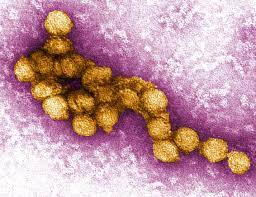West Nile Virus:

The Kerala health department is on alert after the death of a 47-year-old from Thrissur due to the West Nile Virus. The virus was first reported in the state in Alappuzha in 2006 and then in Ernakulam in 2011.
- The West Nile Virus is a mosquito-borne, single-stranded RNA virus.
- It is “a member of the flavivirus genus and belongs to the Japanese Encephalitis antigenic complex of the family Flaviviridae”.
- Culex species of mosquitoes act as the principal vectors for transmission.
- It is transmitted by infected mosquitoes between and among humans and animals, including birds, which are the reservoir host of the virus.
- WNV can also spread through blood transfusion, from an infected mother to her child, or through exposure to the virus in laboratories.
- It is not known to spread by contact with infected humans or animals. To date, no human-to-human transmission of WNV through casual contact has been documented.
- The disease is asymptomatic in 80% of the infected people. In rest of the 20% cases, the symptoms include fever, headache, fatigue, body aches, nausea, rash, and swollen glands.
- This vector-borne disease can be prevented by protecting one-self from mosquito bites.
- Other steps are wearing clothing that acts as a barrier to exposure to bites, reducing breeding sites, covering water storage containers and eliminating puddles and drainage of places where water accumulates.




